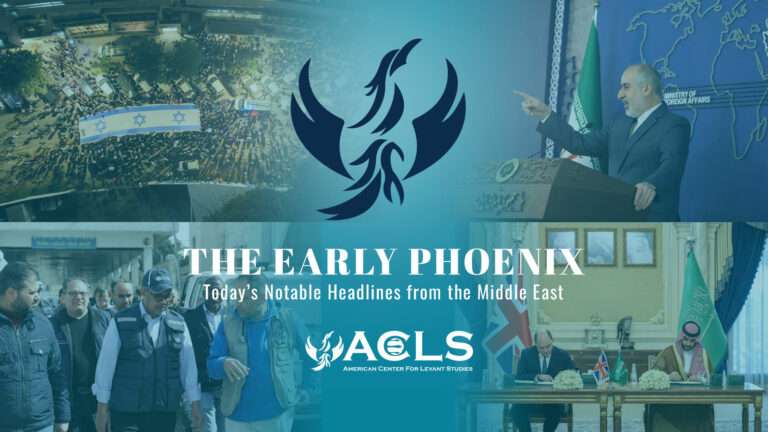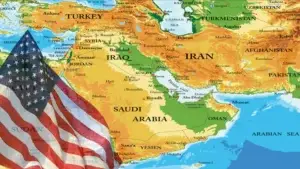THE EARLY PHOENIX
A first look at today’s most notable stories from the Middle East, selected by ACLS experts
2 March 2023
SubscribePrintable Version

ISRAEL AND PALESTINIAN TERRITORIES
1. Israel Arrests Settlers Suspected in Hawara Attack (Al Sharq Al Awsat). Israeli police have arrested five suspects in an attack by settlers in the West Bank this week, an attack an Israeli general described as a “massacre.” The attack followed a shooting by a Palestinian that left two Israelis dead. According to Reuters, residents said shops in the Palestinian village of Hawara remained closed by order of the army on Wednesday, amid an intense Israeli military deployment. The Israeli police, for their part, said they expected more arrests during the ongoing investigation into settler violence in and around the Palestinian village of Huwwara.
2. Sara Netanyahu Evacuated from Hair Salon Surrounded by Protesters; Security Forces Rescued Sara from the Salon She Had Been Prevented from Leaving (Jerusalem Post). After three hours, Prime Minister Benjamin Netanyahu’s wife, Sara Netanyahu, was evacuated from a hair salon in Tel Aviv, according to Hebrew media. Security forces rescued Netanyahu from the salon where hundreds of thousands of protesters stood blocking the exit, preventing her from leaving. Security forces acted as if she was still inside as they evacuated her to a vehicle and drove away from the scene. The forces didn’t leave until notified the vehicle managed to get away.
IRAN
3. Iran Expels Two German Diplomats (Tehran Times). Iran announced Wednesday that it was declaring two German diplomats based in Tehran as persona non grata in a tit-for-tat move. In a statement on Wednesday, Iranian Foreign Ministry Spokesman Nasser Kanaani said Tehran has expelled the two German diplomats after declaring them persona non grata because of the meddling and irresponsible actions of the German government in regard to the Islamic Republic of Iran’s internal and judicial affairs.
4. UK, Canada, Russia-Based Firms Helping Iran Spy On Mobile Phones (Iran International). Foreign companies from the UK, Canada, and Russia are cooperating with an Iranian telecommunication company to track protesters and access the content of their calls or messages, according to Iran International. The Iranian company, Ariantel, has allegedly deployed a fully operational mobile network in Iran, which has integrated with Iran’s Communication Regulation Authority’s legal intercept system. The leaked internal documents reveal the level of sophistication sought by the Iranian authorities to conduct surveillance operations and control access to mobile information and communications. Iran’s biggest mobile companies are mainly owned by the Revolutionary Guards, the Islamic Republic’s main force in quashing ongoing protests.
5. Pakistani Delegation Due In Tehran for Crisis Talks Over Gas Pipeline Delay (Iran International). A delegation from Pakistan is due in Tehran soon for crisis talks to avert a possible $18 billion fine to Pakistan for its part in delaying the transfer of Iranian gas. Officials from the ministries of energy, finance and foreign affairs will meet with diplomats in Tehran to discuss the crisis. The project was supposed to be implemented by 2015, but international and US sanctions against Iran and Washington’s pressure on Islamabad have prevented its implementation so far.
THE GULF REGION
6. Amidst a Wave of Arab Normalization, Qatar Renews its Rejection of Rapprochement with the Assad Regime (Al Khaleej Online). Qatar has reiterated its stance on the Syrian regime, stating that it remains unchanged despite a recent trend among Arab nations towards normalizing relations with Bashar al-Assad’s government in the past few years. Majid al-Ansari, a spokesperson for the Qatari Ministry of Foreign Affairs, stated in a press briefing on Tuesday that the reasons for Syria’s suspension from the Arab League still exist and that there will be no alteration in Qatar’s position on this matter unless a genuine political solution is reached.
7. Saudi Arabia, UK Sign Defense Agreement (Al Arabiya English). Saudi Arabia’s Defense Minister Prince Khalid bin Salman has met with Britain’s Defense Minister Ben Wallace on Wednesday in the Saudi capital Riyadh. During the meeting a declaration of intent regarding the Kingdom’s participation in the Future Combat Air System (FCAS) program has been signed, according to the Saudi Press Agency (SPA). The Future Combat Air System (FCAS), first announced in 2017 by French President Emmanuel Macron and then German Chancellor Angela Merkel, is designed to replace the Eurofighter and the Dassault Rafale with a combination of manned and unmanned aircraft from 2040.
YEMEN
8. Top al-Qaeda Figure Killed in Yemen Air Strike (Al Arabiya English). Hamad bin Hamoud al-Tamimi, a top leader of al-Qaeda in the Arabian Peninsula (AQAP), which Washington regards as among the global extremist network’s most dangerous branches, died in the strike along with a bodyguard, a security official said, requesting anonymity. Tamimi, also known as Abdel Aziz al-Adnani, headed up AQAP’s leadership council and acted as the militant group’s “judge,” the sources said.
IRAQ
9. Guterres Calls for Accelerating Implementation of the Shingal Agreement and the Dialogue Between Erbil and Baghdad Regarding the Region’s Share in the Budget (Bas News). On a visit to Iraq, Antonio Guterres, the United Nations Secretary-General, called for the speedy implementation of the Shingal (Sinjar) agreement and urged the Kurdistan Regional Government to hold a dialogue with the federal government on the region’s budget. Guterres expressed the UN’s commitment to support Iraq in consolidating its democratic institutions, advancing peace, sustainable development, and human rights for all Iraqis. The Secretary-General also commended Iraq’s commitment to advancing dialogue and diplomacy for regional stability and appreciated Iraq’s efforts to repatriate its citizens from northeastern Syria.
10. Turkish Air Strike Kills PKK-Aligned Yazidi Militia Leader (Asharq News). On Wednesday, a security official in a Yazidi faction loyal to the PKK was killed in a Turkish drone attack in Sinjar, Iraq, according to the Anti-Terrorism agency in the Kurdistan region. The attack also killed the security official’s guard. Two days earlier, a similar attack in Sinjar killed a military official and two fighters from the same Yazidi faction. Turkish forces have been stationed in about 40 military sites and bases in northern Iraq for 25 years, and they target fighters of the Kurdistan Workers’ Party (PKK), who have been in conflict with the Turkish government since 1984.
11. Ankara: Restricting Turkmen Language in Iraq is a Violation of Rights (Daily Sabah). The restriction of the official use of the Turkmen language in northern Kirkuk through the decision of the general secretary of the Iraqi Cabinet is a violation of the basic rights of Turkmens, the Turkish Foreign Ministry said Wednesday. In a written statement, the ministry pointed out that the decision also contradicted the articles of the Iraqi Constitution…“We call on the Iraqi authorities to quickly review this decision,” the statement read. Kirkuk province has a sizeable ethnic Turkmen population, dating back to the Ottoman era, and Iraq’s neighbor Türkiye has taken a firm stance against attempts to manipulate its ethnic makeup.
TURKIYE
12. Turkish Parliament Rejects Proposal to Begin Deporting Syrian Refugees from Turkiye (Zaiton Magazine). The Turkish Parliament has rejected a proposal from opposition parties to start the process of deporting Syrian refugees back to their country following the February 6 earthquake. Deputies from the ruling Justice and Development Party and the National Movement Party rejected the proposal put forward by the Good Party and the Republican People’s Party. The rejected proposal called for the immediate planning and start of the process of returning Syrian refugees to their homeland due to the catastrophic earthquake disaster and the accompanying political, economic, and demographic risks.
13. Turkish Police Arrest an ISIS Leader in Istanbul (Anadolu Agency). Turkish police arrested a leader of ISIS, known as “Abu Hudhaifa,” in Istanbul on Wednesday. The suspect served as a Sharia judge in the terrorist organization in Syria between 2014 and 2018, operating in Tal Abyad, Manbij, and Raqqa.
14. Despite the State of Emergency in 10 Provinces, Erdogan Confirms Elections Will be Held on Time (Al Jazeera). Turkish President Recep Tayyip Erdogan announced that the presidential and parliamentary elections will take place as planned on May 14, despite the recent earthquake that killed over 45,000 people. Erdogan spoke to parliamentarians from the ruling Justice and Development Party, accusing opponents of trying to exploit the earthquake for political purposes.
EGYPT
15. Net Foreign Assets of Egyptian Banking Sector Fell by $5.2 Billion in January (The New Arab). According to Central Bank data, the net foreign assets of Egypt’s banking sector decreased by 160.2 billion Egyptian pounds in January, likely due to the maturity of debts and liquidation of work importers. The net foreign assets of the sector reached negative 654.43 billion pounds, down from negative 494.3 billion in December, resulting in a $5.3 billion decline. This decrease is partly due to foreign debt maturities and import clearing before Ramadan, according to Allen Sandeep of Naeem Brokerage.
16. Egypt to Restore Daylight Savings Time After a Decade (The National). Egypt’s Cabinet on Wednesday decided to restore daylight savings time nearly a decade after it had stopped the practice. A statement said Egyptians will put their clocks forward by one hour on the last Friday of April and put them back by the same time at the end of the last Thursday in October. “The decision was taken in view of the economic conditions and variables the world is witnessing and to save energy,” said the statement. Egypt has over the past year strived to save energy in view of higher costs caused by the Russia-Ukraine war and to make more natural gas available to export to Europe.
TUNISIA
17. Qatar Willing to Finance Development Projects in Tunisia (Al Khaleej Online). Qatar expressed its willingness to fund or contribute to the implementation of projects in Tunisia. The Prime Minister and Interior Minister of Qatar, Sheikh Khalid bin Khalifa Al Thani, discussed this during a meeting with Tunisian President Kais Saeed. The projects include a production platform in Sidi Bouzid, a children’s hospital in Manouba, and cooperation in sports by transferring one of the stadiums that hosted the last World Cup finals to Tunisia.
SYRIA
18. Coalition, SDF Capture over 150 ISIS Members (Bas News). The Kurdish-led Syrian Democratic Forces (SDF), with the support of the US-led Coalition, have captured more than 150 members of the Islamic State (IS) jihadist group in northern Syria. According to a statement released on Tuesday, the operation successfully removed IS sleeper cells that posed a threat to local communities in the region. The Global Coalition issued a Twitter statement saying: “With the support of the Coalition, the Syrian Democratic Forces arrested more than 150 Daesh terrorists in a military operation, removing sleeper cells that pose a threat to communities.”
19. United Kingdom: Drug Trade Finances a Luxurious Lifestyle for the Syrian Regime (Syria TV). The UK Ambassador to the United Nations, Barbara Woodward, addressed the UN Security Council on Tuesday evening, stating that the Syrian regime is causing instability in the region by producing and smuggling Captagon, a trade worth tens of billions of dollars. While Syrians live in tents in freezing weather, the regime enjoys a luxurious lifestyle funded by this illegal trade. Ambassador Woodward also extended the UK’s deepest condolences to those affected by the recent earthquake in Syria and Turkey, adding that the UK had provided additional humanitarian funding for northwestern Syria and issued a general authorization to exempt further aid from sanctions..
20. In First Visit of a Senior UN Official to the Region, WHO Director Calls for International Support for Northwest Syria (Al Jazeera). The Director-General of the World Health Organization, Tedros Adhanom Ghebreyesus, made a plea for international support to those affected by the recent earthquake in northwest Syria. This marks the first visit by a high-ranking UN official to the opposition-held areas. The plea comes amidst a rising number of cholera cases, according to medical authorities. Ghebreyesus arrived in Idlib governorate from neighboring Turkey and toured three hospitals in the area. He also inspected a shelter for those impacted by the earthquake .”People in northwest Syria need the international community’s help to recover and rebuild,” Ghebreyesus stated during a press conference following his visit.




